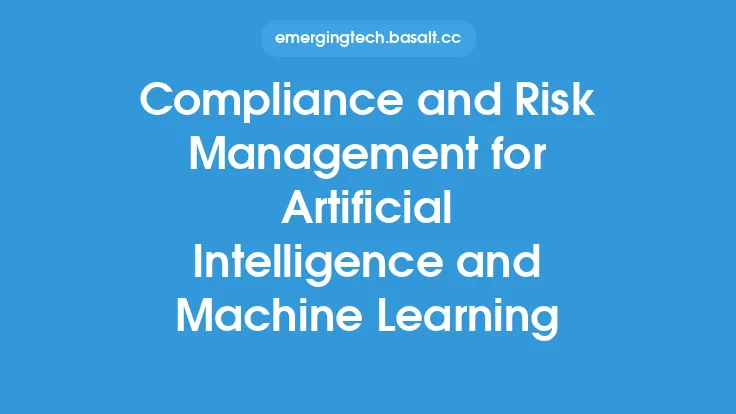The integration of artificial intelligence (AI) in wealth management portfolios has been a significant development in the fintech industry. AI has the potential to revolutionize the way wealth managers and investors approach portfolio management, risk assessment, and investment decisions. By leveraging AI algorithms and machine learning techniques, wealth managers can create more efficient, personalized, and data-driven investment strategies.
Introduction to AI in Wealth Management
AI in wealth management refers to the use of artificial intelligence technologies, such as machine learning, natural language processing, and computer vision, to analyze and interpret large datasets, identify patterns, and make predictions about market trends and investment opportunities. AI can be applied to various aspects of wealth management, including portfolio optimization, risk management, and investment research. The goal of AI in wealth management is to provide more accurate and timely investment decisions, reduce costs, and improve overall portfolio performance.
Benefits of AI in Wealth Management
The integration of AI in wealth management portfolios offers several benefits, including:
- Improved portfolio optimization: AI algorithms can analyze large datasets and identify the most optimal portfolio allocation based on an investor's risk tolerance, investment goals, and market conditions.
- Enhanced risk management: AI can help wealth managers identify potential risks and opportunities, allowing them to make more informed investment decisions and adjust their portfolios accordingly.
- Increased efficiency: AI can automate many tasks, such as data analysis, reporting, and compliance, freeing up wealth managers to focus on higher-value tasks, such as investment strategy and client relationships.
- Personalized investment advice: AI can help wealth managers provide more personalized investment advice to their clients, based on their individual financial goals, risk tolerance, and investment preferences.
- Cost savings: AI can help reduce costs associated with traditional wealth management, such as labor costs, infrastructure costs, and trading costs.
AI Techniques Used in Wealth Management
Several AI techniques are used in wealth management, including:
- Machine learning: Machine learning algorithms can be trained on large datasets to identify patterns and make predictions about market trends and investment opportunities.
- Deep learning: Deep learning algorithms can be used to analyze complex datasets, such as financial statements, economic indicators, and market data.
- Natural language processing: Natural language processing algorithms can be used to analyze text-based data, such as financial news, social media, and company reports.
- Computer vision: Computer vision algorithms can be used to analyze visual data, such as charts, graphs, and images.
Applications of AI in Wealth Management
AI has several applications in wealth management, including:
- Portfolio optimization: AI can be used to optimize portfolio allocation, based on an investor's risk tolerance, investment goals, and market conditions.
- Investment research: AI can be used to analyze large datasets, identify patterns, and make predictions about market trends and investment opportunities.
- Risk management: AI can be used to identify potential risks and opportunities, allowing wealth managers to make more informed investment decisions and adjust their portfolios accordingly.
- Client segmentation: AI can be used to segment clients based on their financial goals, risk tolerance, and investment preferences, allowing wealth managers to provide more personalized investment advice.
Challenges and Limitations of AI in Wealth Management
While AI has the potential to revolutionize the wealth management industry, there are several challenges and limitations to its adoption, including:
- Data quality: AI algorithms require high-quality data to make accurate predictions and decisions. Poor data quality can lead to biased or inaccurate results.
- Regulatory compliance: AI must comply with regulatory requirements, such as anti-money laundering and know-your-customer regulations.
- Explainability: AI decisions and predictions must be explainable and transparent, to ensure that wealth managers and investors understand the reasoning behind them.
- Cybersecurity: AI systems must be secure and protected from cyber threats, to prevent data breaches and unauthorized access.
Future of AI in Wealth Management
The future of AI in wealth management is promising, with several trends and developments expected to shape the industry, including:
- Increased adoption: AI is expected to become more widely adopted in the wealth management industry, as more firms recognize its potential to improve portfolio performance and reduce costs.
- Advances in machine learning: Advances in machine learning and deep learning are expected to improve the accuracy and efficiency of AI algorithms, allowing them to analyze larger and more complex datasets.
- Integration with other technologies: AI is expected to be integrated with other technologies, such as blockchain, cloud computing, and the Internet of Things, to create more efficient and secure wealth management systems.
- Regulatory developments: Regulatory developments, such as the introduction of new regulations and guidelines, are expected to shape the adoption and use of AI in wealth management.





